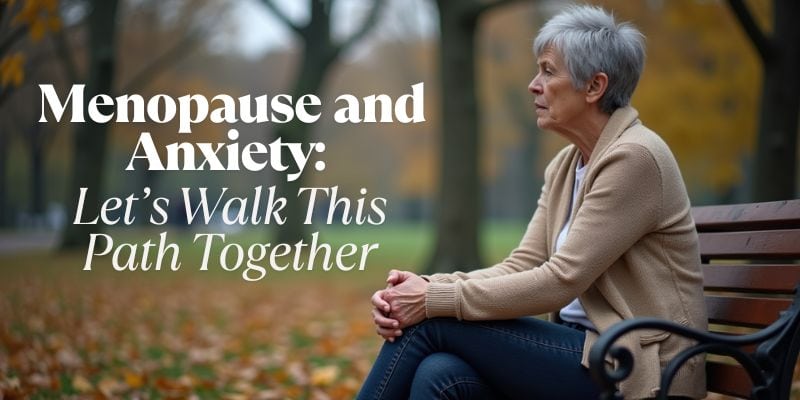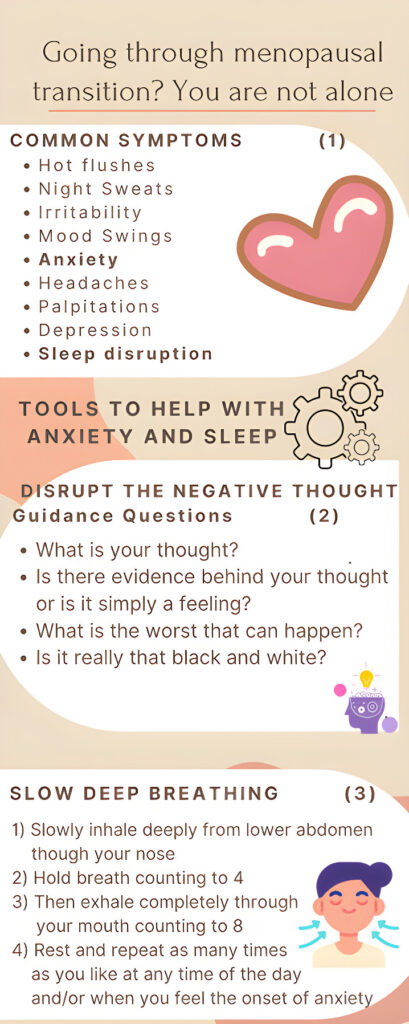Charmchi et al. (2016) concluded that, on average, women spend one-third of their lives in menopause. Given the duration of this stage, unmanaged symptoms can significantly impact overall well-being, potentially affecting relationships with partners, children, and colleagues.
You are not alone
What is Menopausal Transition and Some Common Symptoms?
An article published by the National Institute on Aging (2021) defines menopause transition (MT), also known as perimenopause, as the time leading up to the permanent cessation of menstrual cycles, with menopause officially occurring 12 months after the last menstrual period. During this transition, many women experience symptoms of menopause that can significantly impact their daily lives, including mood swings, memory lapses, weight gain, and discomfort during intercourse. According to an article written by Yeo (2024) menopause age in Singapore, on average is 49, which is slightly below the 51-age range in Western society.
Furthermore, Crandall et al. (2023) report that approximately 50% to 75% of women experience vasomotor symptoms (VS), such as night sweats and hot flashes from menopause, which can disrupt sleep patterns. Sleep deprivation, in turn, has been linked to increased anxiety (Palmer & Alfano, 2020). Additionally, research by Juang et al. (2005) indicates that anxiety and depressive symptoms are more prevalent in women undergoing the menopause transition and postmenopause. Siegel and Mathews (2015) further argue that this transition represents a “window of vulnerability” for the onset of anxiety symptoms, which, if left undiagnosed or untreated, can negatively impact quality of life.
If you are experiencing any of these symptoms, it is advisable to consult a healthcare professional to determine whether you are undergoing MT. To help manage these symptoms, some women may undergo hormone replacement therapy (HRT). However, for those who cannot or choose not to use HRT, non-medicated alternatives may be recommended in conjunction with medical guidance from your GP to alleviate symptoms effectively.
Menopause Counselling to Assist with Vasomotor Symptoms
If vasomotor symptoms are a triggering factor disrupting your sleep, the resulting sleep disturbances can contribute to anxiety, which may, in turn, lead to negative thought patterns. Research conducted by Ayers et al. (2012) found that Cognitive Behavioural Therapy (CBT) is an effective approach for managing VS in women experiencing MT and postmenopause. CBT is based on the principle that thoughts influence emotions, which subsequently affect behaviour. By reframing negative thoughts, individuals can enhance their emotional well-being and behavioural responses.
Additionally, slow deep breathing (SDB) exercises, a component of CBT, have been shown to help mitigate sleep disruptions. Studies by Gunasekaran (2020) and SULUR (2007) concluded that SDB can be beneficial for women experiencing VS during MT, offering a practical and non-invasive strategy for symptom management.
Below is a diagram illustrating examples of questions you can ask yourself to support mental wellness therapy for menopause and menopausal anxiety.
Seeking Professional Help
Through menopause counselling and psychological support, there are various CBT techniques that can be tailored to individual needs. A counsellor can help set personalised goals and identify the most suitable methods to integrate into one’s lifestyle, providing a structured framework for success. In addition to this, Charmchi et al., (2016) concluded that CBT group therapy is successful in helping to increase psychological resilience and anxiety for women who are going through MT. Research conducted by Soori et al., (2019) they concluded that after six-90-minute CBT sessions conducted in a group setting helped decrease symptoms linked to MT.
You are not alone. At Insightful Counselling and Training, our qualified counsellors Mhairi Jerga is here to support you in managing anxiety and depression as you navigate the menopause transition. Additionally, if you are interested in online group counselling within a safe and confidential environment, please contact us for information.
References-
– Ayers, B., Smith, M., Hellier, J., Mann, E., & Hunter, M. S. (2012). Effectiveness of group and self-help cognitive behavior therapy in reducing problematic menopausal hot flushes and night sweats (MENOS 2): a randomized controlled trial. Menopause, 19(7), 749-759.
– Charmchi, N., Asgari, P., Hafezi, F., Makvandi, B., & BakhtiarPour, S. (2016). The effect of “Cognitive Behavior Therapy” in method group on anxiety and psychological resilience of menopausal women. Journal of Health Promotion Management, 5(5), 15-22.
– Crandall, C. J., Mehta, J. M., & Manson, J. E. (2023). Management of menopausal symptoms: a review. Jama, 329(5), 405-420.
– Gunasekaran, M. (2020). A Quasi Experimental Study to Assess the Effectiveness of Deep Breathing Exercise on Reduction of Menopausal Symptoms among Menopausal Women Residing in Selected Rural Community Areas, Krishnagiri. Krishnagiri, 1(1), 62-66.
– Juang, K.-D., Wang, S.-J., Lu, S.-R., Lee, S.-J., & Fuh, J.-L. (2005). Hot flashes are associated with psychological symptoms of anxiety and depression in peri-and post-but not premenopausal women. Maturitas, 52(2), 119-126.
– NIH National Institute on Aging (NIA)(2021, September 30). What is Menopause? https://www.nia.nih.gov/health/menopause/what-menopause#
– Palmer, C. A., & Alfano, C. A. (2020). Anxiety modifies the emotional effects of sleep loss. Current Opinion in Psychology, 34, 100-104.
1. Porter, M., Penney, G. C., Russell, D., Russell, E., & Templeton, A. (1996). A population based survey of women’s experience of the menopause. BJOG: An International Journal of Obstetrics & Gynaecology, 103(10), 1025-1028.
– Sellakumar, G. K. (2015). Effect of slow-deep breathing exercise to reduce anxiety among adolescent school students in a selected higher secondary school in Coimbatore, India. Journal of Psychological and Educational Research (JPER), 23(1), 54-72.
2. Siegel, A. M., & Mathews, S. B. (2015). Diagnosis and treatment of anxiety in the aging woman. Current psychiatry reports, 17, 1-8.
– Soori, M., Kolivand, M., Abolfathi Momtaz, Y., & Noori, P. (2019). The Effect of Cognitive–Behavioral Group Therapy on Menopausal Symptoms. Journal of Babol University of Medical Sciences, 21(1), 215-222.
3. Stanborough, R.J (February 4, 2020) How to change negative thinking with Cognitive Restructuring. Cognitive Restructuring: Techniques and Examples (healthline.com)
– Sulur, C. A study to assess the effectivenss of deep breathing exercise on hot flushes experince of meonpausl women in a selected community area in Sulur at Coimbatore.
– Yeo, S. (2024, January 19). Is Singapore ready for the menopause wave from a super ageing society? The Sunday Times, SingHealth Duke-NUS Academic Medical Centre. https://www.singhealthdukenus.com.sg/news/patient-care/is-singapore-ready-for-the-menopause-wave-from-a-super-ageing-society









